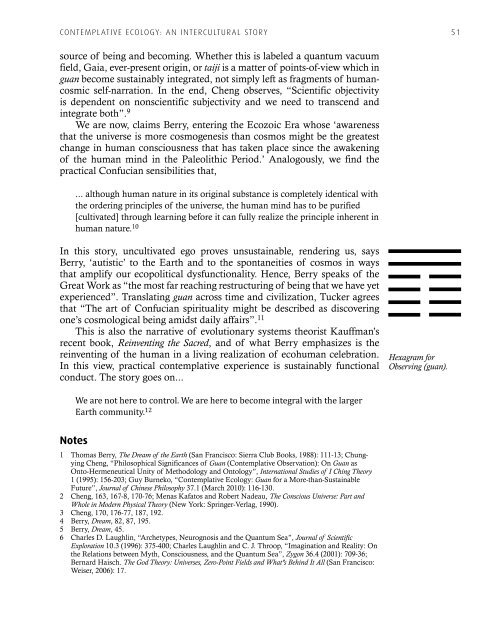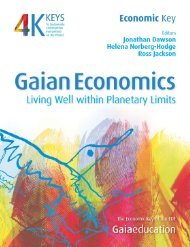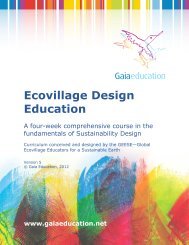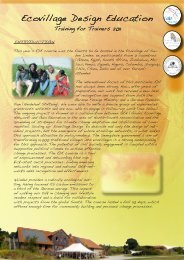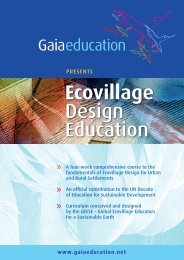Designing Ecological Habitats - Gaia Education
Designing Ecological Habitats - Gaia Education
Designing Ecological Habitats - Gaia Education
Create successful ePaper yourself
Turn your PDF publications into a flip-book with our unique Google optimized e-Paper software.
contemplative ecology: an intercultural story 51<br />
source of being and becoming. Whether this is labeled a quantum vacuum<br />
field, <strong>Gaia</strong>, ever-present origin, or taiji is a matter of points-of-view which in<br />
guan become sustainably integrated, not simply left as fragments of humancosmic<br />
self-narration. In the end, Cheng observes, “Scientific objectivity<br />
is dependent on nonscientific subjectivity and we need to transcend and<br />
integrate both”. 9<br />
We are now, claims Berry, entering the Ecozoic Era whose ‘awareness<br />
that the universe is more cosmogenesis than cosmos might be the greatest<br />
change in human consciousness that has taken place since the awakening<br />
of the human mind in the Paleolithic Period.’ Analogously, we find the<br />
practical Confucian sensibilities that,<br />
... although human nature in its original substance is completely identical with<br />
the ordering principles of the universe, the human mind has to be purified<br />
[cultivated] through learning before it can fully realize the principle inherent in<br />
human nature. 10<br />
In this story, uncultivated ego proves unsustainable, rendering us, says<br />
Berry, ‘autistic’ to the Earth and to the spontaneities of cosmos in ways<br />
that amplify our ecopolitical dysfunctionality. Hence, Berry speaks of the<br />
Great Work as “the most far reaching restructuring of being that we have yet<br />
experienced”. Translating guan across time and civilization, Tucker agrees<br />
that “The art of Confucian spirituality might be described as discovering<br />
one’s cosmological being amidst daily affairs”. 11<br />
This is also the narrative of evolutionary systems theorist Kauffman’s<br />
recent book, Reinventing the Sacred, and of what Berry emphasizes is the<br />
reinventing of the human in a living realization of ecohuman celebration.<br />
In this view, practical contemplative experience is sustainably functional<br />
conduct. The story goes on...<br />
We are not here to control. We are here to become integral with the larger<br />
Earth community. 12<br />
Notes<br />
1 Thomas Berry, The Dream of the Earth (San Francisco: Sierra Club Books, 1988): 111-13; Chungying<br />
Cheng, “Philosophical Significances of Guan (Contemplative Observation): On Guan as<br />
Onto-Hermeneutical Unity of Methodology and Ontology”, International Studies of I Ching Theory<br />
1 (1995): 156-203; Guy Burneko, “Contemplative Ecology: Guan for a More-than-Sustainable<br />
Future”, Journal of Chinese Philosophy 37.1 (March 2010): 116-130.<br />
2 Cheng, 163, 167-8, 170-76; Menas Kafatos and Robert Nadeau, The Conscious Universe: Part and<br />
Whole in Modern Physical Theory (New York: Springer-Verlag, 1990).<br />
3 Cheng, 170, 176-77, 187, 192.<br />
4 Berry, Dream, 82, 87, 195.<br />
5 Berry, Dream, 45.<br />
6 Charles D. Laughlin, “Archetypes, Neurognosis and the Quantum Sea”, Journal of Scientific<br />
Exploration 10.3 (1996): 375-400; Charles Laughlin and C. J. Throop, “Imagination and Reality: On<br />
the Relations between Myth, Consciousness, and the Quantum Sea”, Zygon 36.4 (2001): 709-36;<br />
Bernard Haisch. The God Theory: Universes, Zero-Point Fields and What’s Behind It All (San Francisco:<br />
Weiser, 2006): 17.<br />
Hexagram for<br />
Observing (guan).


